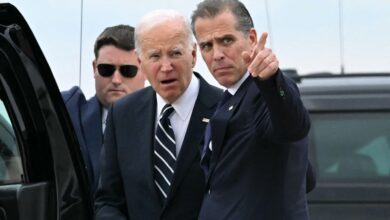Trump’s lesson for Colombia — don’t mess with the US

As the popular saying nearly goes, the president of Colombia has just futzed around and found out.
Over the weekend, Gustavo Petro refused to allow two previously approved military flights carrying deported Colombian citizens to land, demanding that Colombians kicked out of the United States travel by civilian aircraft only, as he deemed military transport to be inhumane.
President Trump responded on Truth Social, unleashing the whirlwind Petro’s political posturing reaped, slapping 25% tariffs on all Colombian imports, revoking the visas of Colombian government officials and members of Colombia’s Humana political party, and imposing customs and banking sanctions.
To underscore the earnestness of Trump’s intent, Marco Rubio’s State Department immediately shuttered the visa section of the US embassy in Bogota, where 1,500 visas are pending.
Within hours, Petro was on his heels attempting to save face by offering his presidential plane as transport for the deported Colombians.
This meekly defiant gesture is typical of Latin American Marxists, who profess love for their people while blaming the United States for all their woes.
While the Biden and Obama administrations seemed to accept the blame, given their ineffective, conciliatory policies with the region’s leftist regimes, this latest tit-for-tat suggests the Trump administration will not. Nor should it.
For decades, far-left Latin American leaders have held onto power by taking a scorched-earth approach to democracy, free markets and individual freedoms of their citizen subjects.
The millions who have fled Cuba, Venezuela and Nicaragua for the United States are a testament to that fact.
Most recently, since Petro assumed office in 2022, the number of Colombians illegally entering the United States rose significantly. While there were just over 6,000 encounters with Colombian migrants on the US-Mexico border in 2021, more than 125,000 were recorded in both 2022 and 2023.
But it’s no wonder Colombians want out. While Gustavo Petro has been in office for a much shorter time than his compatriots in Caracas and Havana, he seems to be making up for lost time by weakening his country with destructive domestic policy.
As a former member of the Marxist guerrilla group, M-19, Petro’s thinly veiled sympathy toward narco-terrorist organizations like the Revolutionary Armed Forces of Colombia (or FARC) and the National Liberation Army (or ELN) has allowed both groups to gain strength, killing Colombian citizens and each other with seemingly impunity.
Petro’s inability to rein in the violence, coupled with his ideological ambivalence toward Colombia’s armed forces, has severely deteriorated Colombian national security.
So too has his quiet support of Nicolas Maduro’s illegitimate re-election in Venezuela last year, as Maduro’s administration provides a safe harbor to both the FARC and the ELN.
Under the Petro administration, the Colombian economy has faltered, growing less than 1% in 2023, with an estimated growth of 2% for 2024.
Foreign investment has also stagnated, no doubt due in part to the resurgence of armed conflict.
Colombia now exports billions of dollars’ worth of goods to the US annually. If tariffs of 25% took effect, Colombia’s economy would suffer a debilitating blow.
And for what? An airplane upgrade?
Petro’s posturing is maddeningly arrogant. Prior Colombian administrations have forged strong relationships with the United States.
And these days, a strong relationship with the United States is exactly what Colombia needs. In the past, the US has invested billions of dollars in Colombia by way of successful military, humanitarian-assistance and economic-aid programs.
Now that all American foreign assistance programs are under the new administration’s review, Petro’s public antipathy towards Trump, let alone the United States, could jeopardize future aid from which both nations have benefited.
In the end, Petro capitulated, accepting all of Trump’s terms: The deported Colombians will land in Bogota and tariffs won’t be imposed.
And should President Petro insist on joining his military Marxist neighbors by taking an anti-American foreign policy stance in the future, he now knows what’s at stake.
The rounds of rapid-fire diplomacy have left Petro backing off the world stage with weakened credibility, having nearly alienated a great friend of the Colombian people.
And Trump was right to put Petro in his place.
Past administrations have treated far-left Latin American heads of state as the leaders they wish them to be, rather than the leaders they are.
But with Donald Trump in the White House and Marco Rubio in the State Department, the days of coddling our anti-American Marxist neighbors are over.
From now on, the new president has made it abundantly clear: If they futz around with the United States, they’ll find out.
Christine Balling is a senior vice president at the Institute of World Politics and a former senior adviser to the US Special Operations South commander.




